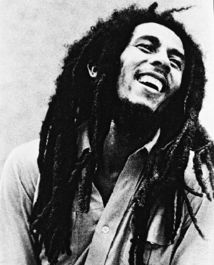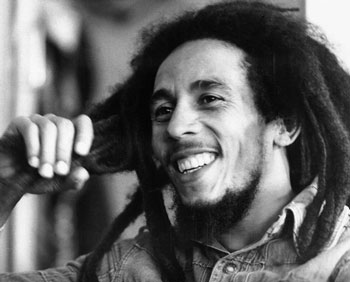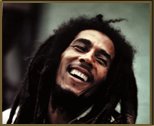----xxxxXXXXBOB MARLEYXXXxxx----

Bob Marley Biography Bob Marley was born 6th February 1945 in a small village called Nine Miles in the parish of St. Ann, Jamaica. His father was a white British Naval Officer named Norval Marley. Bob had only a scant recollection of his father. This was largely due to the fact that the 'well to do' Marley family did not approve of the relationship Norval had formed with Bobs mother Cedella. His father therefore, despite marrying Cedella, was more an occasional visitor. He did not live to witness the success of his son Bob. Bob cut his first record at the age of 16 in Kingston. A song called 'Judge Not'. In 1963 the original Wailers were formed, the line-up being Bob Marley, Bunny Livingstone (who was later to take the name Wailer), and Peter Tosh. Their first song 'Simmer Down'
was an instant number one in Jamaica.
In 1966 Haile Sellasie visited Jamaica and Bob and the other Wailers embraced the Rastafarian faith and began to grow their 'locks'. Also at around this time they teamed up with the producer Lee Perry for what was to become a very productive but ultimately soured relationship. The union ceased when Perry allegedly sold their material to another label without their knowledge.
In 1972 Chris Blackwell signed the Wailers to his 'Island' label, and gave them 8000 to produce a record. The result - 'Catch A Fire', released in 1973 - was a breakthrough album, triggering international recognition of the Wailers. In the UK they appeared on BBC television, and in New York they opened for Bruce Springsteen at Max's Kansas City Club.The touring schedule proved too much for Bunny and he announced his intention to quit the Wailers. Soon followed by Peter Tosh who left to concentrate on a solo career. And so a new line up emerged, with Bob being the front man of 'Bob Marley and the Wailers'. He retained the stalwart rhythm section of the Barrett brothers (Aston and Carlton) on bass and drums, and added a trio of female backing vocalists called the 'I-Threes', one of which was his wife Rita who had sung occasionally with the Wailers since the beginning.
The first album of the new line-up 'Natty Dread' was a major success. In 1975 Bob Marley and the Wailers played the Roxy in Los Angeles. Among the ectstatic audience (apparently some were dancing on the tables) were Beatles George and Ringo, Bob Dylan, and Jack Nicholson! Back home in Jamaica Bob was becoming revered as a mystic and prophet, his influence was noted by politicians. When Bob approached the then Prime Minister Michael Manley offering to stage a free concert he responded by fixing a date (5 December) that would conveniently coincide with the national elections, thus implying that he had the support of Bob Marley. This dangerous move resulted in an attempt on Bobs life.
On the evening of the 3 December a number of gunmen arrived at Bobs house on Hope Road and shot Bob, his wife Rita, and his manager. These gunmen were thought to be the henchmen of the opposition leader Edward Seaga. Fortunately, nobody was killed, and Bob went ahead with the planned concert defiantly appearing with his arm in a sling. The following year Bob cancelled the last few dates of a big European tour when doctors diagnosed melanoma cancer in the big toe of his right foot. This was the result of a neglected football injury (football being Bobs other major passion alongside music) which occured in Paris when the Wailers took on a team of French journalists some time earlier.
Back home in Jamaica the gunmen leaders of the two warring political factions (The Jamaican Labour Party and the Peoples National Party) approached Bob and asked him to perform at a concert marking a truce between them. The concert titled the 'One Love' Concert took place on 22 April 1978. During the concert Bob persuaded the Prime Minister Manley and the opposition leader Seaga to join him on stage where they shook hands. An incredible event in Jamaica at that time. As a reult of this act Bob received the United Nations' Peace Medal in New York the following June.
During 1979 Bob introduced reggae music to the world, touring Japan, Australia and New Zealand.
In 1980 he headlined the independence celebrations in Zimbabwe, one of the dignitaries present being non other than Prince Charles!In September of this same year Bob collapsed while jogging in Central Park, New York, just after commencing the American leg of a world tour with the 'Commodores' playing support. Doctors told him the shocking news that the cancer (previously considered to have been cleared) had returned and was present in his lungs and brain. Despite this he flew to Pittsburg where on the 23 September 1980 he performed his last concert at the Stanley Theatre.
Initially Bob was treated in New York but the doctors eventually said there was nothing more they could do for him. He flew to Bavaria where he was treated by the unconventional Dr Issels. First signs were encouraging and for a while it appeared that Bob was improving. However by the beginning of May Dr Issels had to tell him that there was no longer any hope. Bob intended to end his days back in Jamaica but was so ill that he had to check into a hospital in Miami en route.
Here he died on 11 May 1981.
His body was returned to Jamaica where it was placed in a specially constructed mausoleum at his birthplace, Nine Miles.
Bob Marley was a hero figure, in the classic mythological sense. His departure from this planet came at a point when his vision of One World, One Love - inspired by his belief in Rastafari - was beginning to be heard and felt. The last Bob Marley and the Wailers tour in 1980 attracted the largest audiences at that time for any musical act in Europe.
Bob's story is that of an archetype, which is why it continues to have such a powerful and ever-growing resonance: it embodies political repression, metaphysical and artistic insights, gangland warfare and various periods of mystical wilderness. And his audience continues to widen: to westerners Bob's apocalyptic truths prove inspirational and life-changing; in the Third World his impact goes much further. Not just among Jamaicans, but also the Hopi Indians of New Mexico and the Maoris of New Zealand, in Indonesia and India, and especially in those parts of West Africa from wihch slaves were plucked and taken to the New World, Bob is seen as a redeemer figure returning to lead this planet out of confusion.
In the clear Jamaican sunlight you can pick out the component parts of which the myth of Bob Marley is comprised: the sadness, the love, the understanding, the Godgiven talent. Those are facts. And although it is sometimes said that there are no facts in Jamaica, there is one more thing of which we can be certain: Bob Marley never wrote a bad song. He left behind the most remarkable body of recorded work. "The reservoir of music he has left behind is like an encyclopedia," says Judy Mowatt of the I-Threes. "When you need to refer to a certain situation or crisis, there will always be a Bob Marley song that will relate to it. Bob was a musical prophet."
The tiny Third World country of Jamaica has produced an artist who has transcended all categories, classes, and creeds through a combination of innate modesty and profound wisdom. Bob Marley, the Natural Mystic, may yet prove to be the most significant musical artist of the twentieth century.
Bob Marley gave the world brilliant and evocative music; his work stretched across nearly two decades and yet still remains timeless and universal. Bob Marley & the Wailers worked their way into the very fabric of our lives.
"He's taken his place alongside James Brown and Sly Stone as a pervasive influence on r&b", says the American critic Timothy White, author of the acclaimed Bob Marley biography CATCH A FIRE: THE LIFE OF BOB MARLEY. "His music was pure rock, in the sense that it was a public expression of a private truth."
It is important to consider the roots of this legend: the first superstar from the Third World, Bob Marley was one of the most charismatic and challenging performers of our time and his music could have been created from only one source: the street culture of Jamaica.
The days of slavery are a recent folk memory on the island. They have permeated the very essence of Jamaica's culture, from the plantation of the mid-nineteenth century to the popular music of our own times. Although slavery was abolished in 1834, the Africans and their descendants developed their own culture with half-remembered African traditions mingled with the customs of the British.

The worldwide icon of reggae, Bob Marley was the first artist to bring the music and stories of Jamaica to the outside world. His music tells the tales of poverty, hardship, and spirituality that is an integral part of Jamaican culture.
Robert Nesta Marley was born to a teenage black mother and middle-aged white father in Jamaica in 1945. When Marley was 14, he and his mother left their rural home and headed for Kingston, where they settled in the slums of 'Trenchtown".
He and his friends were fascinated by the sounds they heard on American radio, as well as the music of local black vocal groups. In 1962, the 17 year old Marley auditioned for a local music entrepreneur by the name of Leslie Kong. This audition led to a studio session and, a year later, to the formation of a group known as the Teenagers, a five-part vocal ensemble which evolved into the Wailers.
When two members left the group in 1964, Marley became the lead vocalist, and quickly steered the group's next album to #1 on the Jamaican pop charts. In 1974, after a string of successes, two of the three Wailers left the group to pursue solo careers. This prompted Marley to bring in his wife's group, a vocal trio called the I-Threes, bringing the new lineup on an international tour in 1975. They sold out shows all over the world, and found their names on the top of the charts in both England and the US.
Marley's fame was considerable outside of Jamaica, but in his home country he was viewed with even greater admiration. He attained a larger-than-life persona as a poet and prophet, a heroic individual whom the nation adored and followed. In 1981, Marley succumbed to cancer at the age of 36. The fame he managed to amass in his comparatively short musical career demonstrates the extraordinary power of his music.
The cancer that killed Bob Marley started in his right big toe. Doctors advised him to have the toe amputated, but he refused, saying "Rasta no abide amputation. I and I don't allow a mon ta be dismantled." The cancer proceeded to spread to the rest of his body and he was dead within four years.
In 1976, gunmen broke into Marley's home and shot him and his wife, although both survived. The assasination attempt was assumed to be politically motivated, as he had recently demonstrated support for the progressive prime minister of Jamaica, Michael Manley.
Bob Marley had a long connection to Africa and especially to Ethiopia, the country that is the spiritual homeland of Rastafari. Later in his career he picked up the cause of pan-African unity and wrote several songs on the subject for his ninth album "Survival." In January 2005, in fact, it was announced that his wife plans to have his remains exhumed and moved to Ethiopia. Rita Marley explained the decision by saying: "Bob's life is about Africa, it is not Jamaica."

On May 11, 1981 : Bob Marley dies at the age of 36.
On May 11, 1981 Bob Marley died in the Cedars of Lebanon hospital in Miami. He had been suffering from cancer for some time, and was actually attempting to return to Jamaica from the clinic in Bavaria where he had been receiving treatment.
Born in a small rural village in the hills of St Ann, Jamaica he was subsequently moved by his family to Kingston where he spent much of his adolescence in the ghetto. It was here in Trenchtown that he acquired his nickname 'Tuff Gong', a name he later used for both his recording studio > and his record label. He remained in touch with the people of the ghetto throughout his life, giving away large sums of money to whatever he considered a genuine request or worthwhile cause. When he moved 'uptown' to 56 Hope Road, Kingston, he had an open door policy where people from the poorest parts of Kingston would congregate, play football, smoke herb, and play music.
When a reporter asked Bob how it felt to have moved up from the ghetto Bob replied 'I didn't move from the ghetto, I moved the ghetto'. Bob's driving force was having the opportunity to spread the message of peace and unity both through his music and by giving interviews, which he rarely if ever refused. He shunned material gain.The last words he spoke to his son Ziggy were 'Money can't buy life'.




















0 Comments:
Post a Comment
<< Home